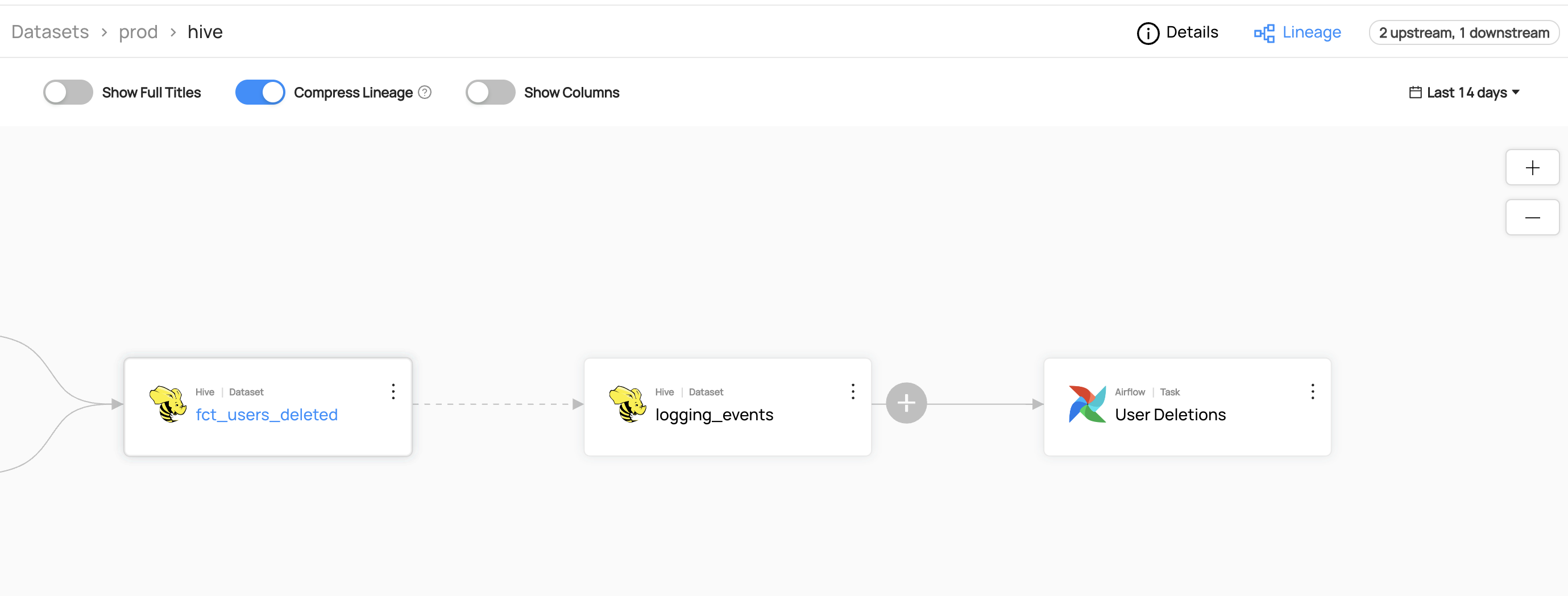Modifying Lineages
Why Would You Use Lineage?
Lineage is used to capture data dependencies within an organization. It allows you to track the inputs from which a data asset is derived, along with the data assets that depend on it downstream. For more information about lineage, refer to About DataHub Lineage.
Goal Of This Guide
This guide will show you how to
- Add: add lineage between two hive datasets named
fct_users_deletedandlogging_events.
Prerequisites
For this tutorial, you need to deploy DataHub Quickstart and ingest sample data. For detailed steps, please refer to Datahub Quickstart Guide.
Before adding lineage, you need to ensure the targeted dataset is already present in your datahub. If you attempt to manipulate entities that do not exist, your operation will fail. In this guide, we will be using data from sample ingestion.
Add Lineage
- GraphQL
- Curl
- Python
mutation updateLineage {
updateLineage(
input: {
edgesToAdd: [
{
downstreamUrn: "urn:li:dataset:(urn:li:dataPlatform:hive,logging_events,PROD)"
upstreamUrn: "urn:li:dataset:(urn:li:dataPlatform:hive,fct_users_deleted,PROD)"
}
]
edgesToRemove: []
}
)
}
Note that you can create a list of edges. For example, if you want to assign multiple upstream entities to a downstream entity, you can do the following.
mutation updateLineage {
updateLineage(
input: {
edgesToAdd: [
{
downstreamUrn: "urn:li:dataset:(urn:li:dataPlatform:hive,logging_events,PROD)"
upstreamUrn: "urn:li:dataset:(urn:li:dataPlatform:hive,fct_users_deleted,PROD)"
}
{
downstreamUrn: "urn:li:dataset:(urn:li:dataPlatform:hive,logging_events,PROD)"
upstreamUrn: "urn:li:dataset:(urn:li:dataPlatform:hive,fct_users_created,PROD)"
}
]
edgesToRemove: []
}
)
}
For more information about the updateLineage mutation, please refer to updateLineage.
If you see the following response, the operation was successful:
{
"data": {
"updateLineage": true
},
"extensions": {}
}
curl --location --request POST 'http://localhost:8080/api/graphql' \
--header 'Authorization: Bearer <my-access-token>' \
--header 'Content-Type: application/json' --data-raw '{ "query": "mutation updateLineage { updateLineage( input:{ edgesToAdd : { downstreamUrn: \"urn:li:dataset:(urn:li:dataPlatform:hive,fct_users_deleted,PROD)\", upstreamUrn : \"urn:li:dataset:(urn:li:dataPlatform:hive,logging_events,PROD)\"}, edgesToRemove :{downstreamUrn: \"urn:li:dataset:(urn:li:dataPlatform:hive,fct_users_deleted,PROD)\",upstreamUrn : \"urn:li:dataset:(urn:li:dataPlatform:hive,fct_users_deleted,PROD)\" } })}", "variables":{}}'
Expected Response:
{ "data": { "updateLineage": true }, "extensions": {} }
# Inlined from /metadata-ingestion/examples/library/lineage_emitter_rest.py
import datahub.emitter.mce_builder as builder
from datahub.emitter.rest_emitter import DatahubRestEmitter
# Construct a lineage object.
lineage_mce = builder.make_lineage_mce(
[
builder.make_dataset_urn("hive", "fct_users_deleted"), # Upstream
],
builder.make_dataset_urn("hive", "logging_events"), # Downstream
)
# Create an emitter to the GMS REST API.
emitter = DatahubRestEmitter("http://localhost:8080")
# Emit metadata!
emitter.emit_mce(lineage_mce)
Expected Outcomes of Adding Lineage
You can now see the lineage between fct_users_deleted and logging_events.

